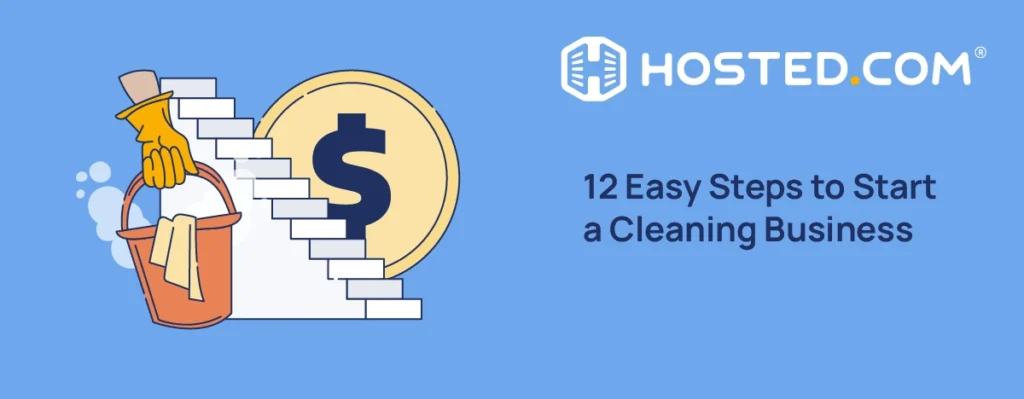
Cleaning services are booming. According to Cognitive Market Research’s Cleaning Services Market Report 2025 (Global Edition), the global cleaning services market is expected to reach $425.645 billion by the end of this year, with growth up to around $726.213 billion by 2033. That means the industry is growing at a strong pace, making this a promising time to build a website to start your own cleaning business.
You don’t need to wait until you have lots of money or fancy tools for this. With basic supplies, a simple plan, and steady effort, you can begin serving homes or offices and earn a profit early on.
This guide teaches you all the steps to start a cleaning business, including how to research your local market, set up your business legally, acquire your first clients through marketing, and manage operations and scale. By the end, you’ll see that starting a cleaning business isn’t just possible, it’s practical.
KEY TAKEAWAYS
- To start a cleaning business is affordable, and choosing between residential, commercial, or both helps define your services.
- A clear business plan with legal setup, licenses, and insurance keeps your company organized and protected.
- Budgeting, bookkeeping, and the right tools ensure your finances stay on track and operations run smoothly.
- Pricing based on costs, competitor research, and profit goals helps you stay competitive and profitable.
- Marketing through referrals, local outreach, and digital channels attracts clients, while hiring and training staff allows you to scale with confidence.
TABLE OF CONTENTS
How to Start Your Own Cleaning Business
Here, we discuss the 12 steps you need to start a cleaning business:
Get to Know Your Local Market
The first step to starting a cleaning business is being clear about who you’ll serve.
- Will you be helping homeowners keep their spaces tidy?
- Or will you focus on commercial offices that need regular upkeep?
- Maybe you can offer services to both?
This choice shapes everything else – your prices, your schedule, and even the equipment you’ll need.
Once you know your target audience, do some research on what’s already happening around you.
To do this:
Do a simple Google search to see which cleaning companies are active in your city. Visit their websites, check their pricing pages, and read customer reviews on Google Business or Yelp.
You can also use Google Trends to spot whether searches for “house cleaning near me” or “office cleaners in [your city]” are increasing.
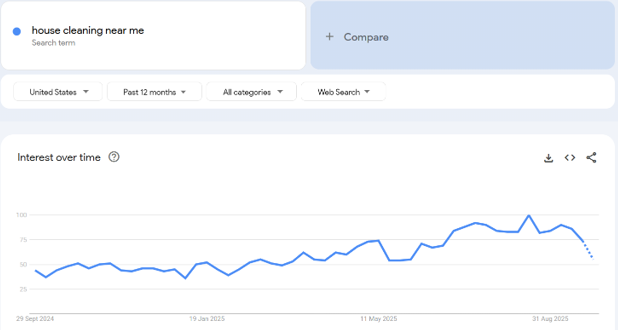
Talking directly with people, whether neighbors, local business owners, or community groups, can also uncover what customers want but aren’t getting.
With that information, picture your ideal client. Families may care about trustworthy cleaners who can service them weekly, while business owners may want reliable after-hours service to prevent disruption. Each group has pain points: some require flexible booking, others worry about harsh chemicals, and many are frustrated with inconsistent service.
Finally, watch out for opportunities. Maybe, no one in your area offers green cleaning with non-toxic products, or cleaning for those moving in or out isn’t covered.
Even something as simple as offering online booking through Jobber, Square Appointments, or Google Calendar could give you an edge if competitors are still relying on phone calls.
Choose Your Cleaning Services
Once you understand your local market, the next step is deciding which cleaning services you’ll offer. When you start a cleaning business, picking the right services helps you stand out while staying profitable.
Most companies start with the basics:
- Residential cleaning for houses or apartments.
- Commercial cleaning for retail spaces and offices.
From there, you can add other services depending on what people need in your area.
For example:
- Deep cleaning.
- Maid service.
- Pool Cleaning.
- Laundry.
- Move-in or move-out cleaning.
- Specialty jobs like:
- Window washing.
- Carpet shampooing.
- Eco-friendly green cleaning.
Starting with a smaller menu keeps things simple, but you can always expand as demand grows.
While selecting your services, consider that green or eco-friendly cleaning has become particularly popular. If you choose these, use non-toxic, biodegradable products that are safer for people, pets, and the environment.
This can also set your business apart, because many clients are willing to pay extra for healthier and sustainable cleaning. The challenge is that green supplies sometimes cost more or are harder to find, so you’ll need to plan carefully.
Suppliers like Seventh Generation or Ecover can be a good starting point, while bulk distributors may help you control costs.

When choosing your service mix, consider these three key points:
- What is in demand where you live?
- With your current skills and equipment, what can you realistically handle?
- Will the costs of supplies, labor, and time leave enough profit after each job?
Finally, check if your area requires any formal training or certifications. In many locations, you don’t need a license for general cleaning, but may require one for specialty services such as carpet or mold cleaning. Optional certifications, such as the Institute of Inspection Cleaning and Restoration Certification (IICRC), can add credibility and give you an edge over competitors.
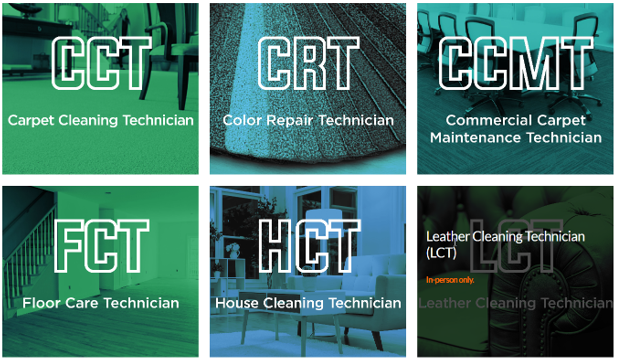
Write a Business Plan
When you start a cleaning business, a business plan acts as your roadmap for growth. It helps you stay focused, shows lenders or investors that you’re serious, and provides a clear path to follow as you build your cleaning company. Without it, it’s easy to lose track of goals or miss key steps along the way.
Your plan should begin with an executive summary, a short overview sharing your vision, values, and long-term goals. This is the big picture of where you want your cleaning business to go. Next, create a company overview that lists your business name, location, and structure, whether you’re a sole proprietor, a partnership, or an LLC.
The next section should explain the services you will offer and your pricing model. Be clear about whether you charge by the hour, by the job, or with flat packages, and explain why this works best for your market. Follow this with a market analysis, which shows that you understand your competitors, target clients, and how you’ll position yourself in the industry.
After that, outline your marketing and sales strategy.
This includes:
- How will you reach clients? Through a website, social media, referrals, or even printed flyers?
- How will you keep them returning?
- Pair this with an operations plan that covers the day-to-day details, like scheduling, invoicing, and managing supplies.
Your business plan should also include financial projections and a budget.
This part shows:
- How much money is required to start?
- What ongoing costs will there be?
- How much can you expect to earn?
This helps you stay realistic and makes it easier to secure financing if you need a small business loan.
Startup costs to start a cleaning business are typically lower than those for many other industries.
Here are some typical expenses you might list in your plan:
- Basic supplies (mops, vacuums, sprays, cloths): $300-$800.
- Eco-friendly or specialty cleaning products: $200-$500.
- Uniforms or branded T-shirts: $100-$300.
- Licensing & permits: $50-$500, depending on your location.
- Insurance: $400-$1,500 per year.
- Marketing materials (business cards, flyers, website setup): $200-$1,000.
- Software for scheduling & invoicing: This varies based on the tool you choose. For instance, Square’s Square Plus plan starts at $49/month per location.
Hosted.com® makes it simple to launch your cleaning business online. Register a Domain, secure Web Hosting, and website tools that help you grow and look professional from day one.
Once you’ve covered the basics, consider the ongoing costs, such as fuel for travel, replacing supplies, or paying staff wages if you decide to hire.
For income projections, consider how many jobs you can realistically handle in a week. For example, if you charge $120 for a standard residential cleaning and book 10 clients per week, that’s $1,200 per week or approximately $4,800 per month before expenses. With commercial cleaning, contracts are often larger, and having a few steady ones can provide a reliable income.
The goal is to balance your costs and revenue to show a clear path to profit. In your plan, include a monthly and yearly breakdown so you can see when you’ll likely break even and when you can expect steady growth.
Finally, prepare a risk assessment that details possible challenges, such as losing a major client or dealing with damaged equipment, and outline your backup plan. Having these steps written down makes your plan stronger and shows you’re ready to adapt.
By writing a clear business plan, you’ll have a guide that not only helps you get started, but also supports you as your cleaning business grows and evolves.
Register Your Company Name & Choose Legal Structure
Before you start serving clients, you need to make your cleaning business official. That begins with choosing a name and deciding how your company will be structured.
Here’s how to do this:
First, select a business name that’s easy to remember and reflects the services you offer. Then, check that the name isn’t already taken in your state or country by searching local business registries.
For example, if you’re in the UK, then:
- Visit Find Company Information to verify name availability.
- Once you find it, go to the Set up a Private Company page to register your business.
It’s also a good idea to see if the matching domain name is available so you can create a website later.

To create your site, you can sign up for our Website Builder or use WordPress Hosting. If using the builder, then the process is straightforward:
- Launch website builder.
- Select a template suited to your niche. We provide 200+ mobile-friendly templates.
- Use our drag-and-drop editor to add and arrange elements like text, images, menus, and buttons.
- Change colors, fonts, and layout to fit your brand identity.
- Upload your logo if you have one.
- Then, create essential pages like Home, About, Blog, Services, and Contact.
- Use clear headings and SEO-friendly titles for each page.
- Add forms (for contact or newsletter sign-ups) using the builder’s widgets.
- Write meta descriptions and titles for each page. Write alt text for images to improve accessibility and search rankings. Ensure URLs are short and descriptive.
- Use the preview mode to see how your site displays on desktop, tablet, and mobile. Fix any layout issues before publishing.
- Once you’re satisfied with your website design and content, click Publish.
- Your site will go live under your domain with Hosted.com’s secure hosting and SSL certificate enabled.
However, if you decide to use WordPress, then you may refer to the following tutorials:
- Step-by-Step Guide to Building A Website With WordPress.
- Install WordPress: 2 Easy Methods.
- Configure WordPress Settings After Installation.
- Install WordPress Themes: A Beginner’s Guide.
- Install Important Plugins, including SEO Plugins.
- Update font, font color, logo, and favicon.
- Create important pages, such as the homepage, landing pages, and blog page.
IMPORTANT:
If you have any issues or want assistance regarding pagination, breadcrumbs, speed, and performance optimization, refer to our WordPress Articles Page.
Next, choose your legal structure.
The most common options are:
- Sole Proprietorship: Simple to set up and inexpensive, but you’re personally responsible for any debts or legal issues.
- Partnership: Good if you’re starting with someone else, but both partners share liability.
- Limited Liability Company (LLC): Protects your personal assets, offers flexibility, and is popular for small service businesses.
- Corporation: More complex with higher costs, but it may be worth it if you plan to grow quickly or seek outside investment.
Each structure has its pros and cons, so consider the size of your business, the level of risk you’re comfortable with, and any local rules where you live. Some cities or states also require specific licenses before you can legally operate.
For stronger protection, consider registering a trademark for your business name or logo. This step helps secure your brand identity so that others can’t copy it. Securing your domain name and setting up an online presence also ensures clients can easily find you when they search for the required cleaning services in your area.
Get Required Licenses & Permits
To start a cleaning business legally, you’ll need the proper licenses and permits. A business license is a basic document issued by your city or state permitting you to operate. Without it, you could face fines or be forced to shut down.
The process of getting a license is usually straightforward. Visit your local government’s website or office to check the exact requirements in your area. Most applications ask for your business name, structure, and contact details, along with a small fee. Some areas may also require a background check, especially if you’ll be working in private homes or offices.
Licenses often need to be renewed every one or two years, so keep track of deadlines to stay compliant. Missing a renewal can interrupt your business and cause legal issues.
Depending on where you live, you may also need extra permits. For example, if you’re transporting cleaning chemicals, you may need to follow environmental or safety permits. Checking all these early saves you time and prevents unexpected problems later.
Get Insurance for Your Business
Even if you’re careful, accidents can happen. That’s why insurance is a must for any cleaning business. It protects you from paying out of pocket if property gets damaged, someone gets hurt on the job, or a worker files a claim. Having coverage also builds trust with clients, as many prefer or require insured providers.
Here are common types of insurance to consider:
- General Liability Insurance: Covers accidents, injuries, or property damage during your work.
- Business Owner’s Policy (BOP): Bundles liability and property coverage in one plan, often at a lower rate.
- Workers’ Compensation: Required if you hire employees, covering injuries on the job.
- Commercial Auto Insurance: Protects your vehicle if you use it for business purposes.
- Professional Liability Insurance: This covers claims if clients say the service wasn’t done properly.
When choosing a policy, consider the level of risk you face and compare multiple providers. Some insurers even offer packages designed for cleaning businesses, which can simplify the process. It’s worth getting quotes from at least three companies so you know you’re paying a fair price for the right protection.
Set up Accounting & Bookkeeping
When you start a cleaning business, managing money properly is one of the keys to keeping your business healthy.
Here’s how you can do it:
- The first step is to separate your personal and business finances. Opening a business bank account makes it easier to track income, pay expenses, and ensure everything is correct for taxes.
- Next, create a budget. List all expected expenses, including supplies, equipment, insurance, marketing, and fuel if you’re traveling to clients. Don’t forget overhead expenses like software or website hosting costs. A budget gives you a clear picture of what you need to earn to stay profitable.
- Decide how you’ll pay yourself. Some business owners take a fixed monthly salary, while others pay themselves a percentage of profits. Either way, plan, so you don’t mix business funds with personal spending.
- Use accounting or bookkeeping software to save time and reduce errors. Tools like QuickBooks, FreshBooks, or Wave can help you track expenses, send invoices, and even prepare for tax season.
- Finally, learn about your tax obligations. Rules vary by country and sometimes even by state or city. Some places require sales tax on services, while others don’t. It’s a good idea to consult an accountant or use tax software so you stay compliant and avoid penalties.
Acquire Cleaning Supplies & Equipment
You can’t start a cleaning business without the correct tools. The good news is that many essentials are affordable and easy to find. At a minimum, you’ll need gloves, masks, rags, a vacuum, a mop, spray bottles, and general cleaners. These cover most basic residential and office jobs.
If you’re offering specialized services, you may need extra tools. For example, carpet cleaning requires a carpet extractor, while window cleaning is easier with squeegees and extension poles. Pressure washing equipment may be necessary if you plan to handle outdoor spaces.
Consider that many clients today request green or eco-friendly products. These are safer for families, pets, and the environment. While they may cost more, using them can help you attract customers who prefer sustainable options. Brands like Seventh Generation, Method, or bulk eco-supply companies are a good place to start.
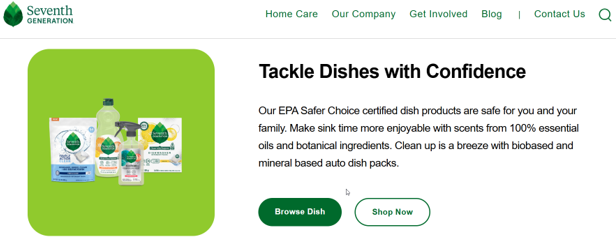
When budgeting, start small. Buy only what you need for the services you’re offering. You can always expand later as you add more clients or services. Buy durable equipment upfront, as cheap tools may break quickly and cost you more in the long run.
Lastly, always follow the safe use of cleaning chemicals. Read labels carefully, avoid mixing products like bleach and ammonia, and store items properly. Safety not only protects you and your team; it also builds trust with clients.
Learn Pricing Strategies & Estimate Jobs
Setting the correct price is one of the most important points to consider when starting a cleaning business. If you charge too little, you won’t be able to cover your costs. If you charge too much, you may lose clients to competitors.
To price wisely, start by researching what other cleaning companies charge in your area. Monitor their websites, online ads, or call them for quotes. This provides a baseline to understand the local market.
Next, decide on your pricing model that works best for your cleaning services:
- Hourly Rate: Great for jobs where the size and time may vary.
- Flat Rate: A set price per job, often used for standard cleanings.
- Per Room or Per Square Foot: Common in commercial cleaning or large properties.
- Premium Pricing: For more specialized services like deep cleaning, carpet care, or eco-friendly options
Once you’ve chosen a model, calculate all your costs. Include labor, cleaning supplies, equipment, fuel, overhead, and even taxes. Then, add a profit margin to ensure the business is sustainable. For example, if a job costs you $70 in labor and supplies, you can charge $120, with a $50 margin.
Ensure you create clear, professional estimates or proposals for clients. Tools like Housecall Pro, or even simple templates in Google Docs, can help you send professional quotes quickly.
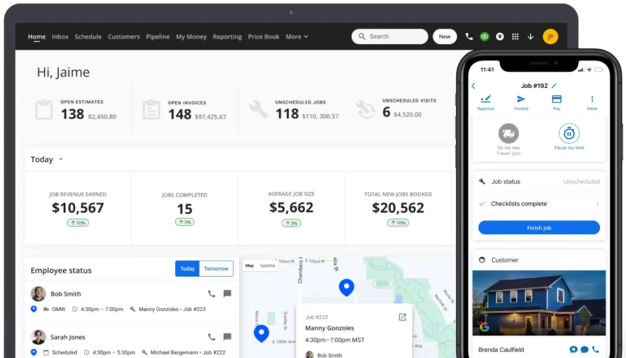
If you’re offering premium services like green cleaning or specialized treatments, explain the benefits to clients. Many people are willing to spend more if they see the value in healthier products, better equipment, or specialty expertise.
Market Your Business & Get First Customers
Once you successfully start a cleaning business, it’s time for marketing.
For this:
- Build a brand identity. A simple logo, consistent name, and uniforms make your business look professional and trustworthy.
- Your personal network is a great place to start. Let friends, family, and neighbors know about your services and ask for referrals. A happy first customer can often lead to more through word of mouth.
- Use offline marketing tactics to spread the word locally. Hand out business cards, place flyers in community spaces, leave door hangers around neighborhoods, or brand your vehicle with your company name and phone number. These small efforts keep your name visible.
- Building partnerships can also give you steady business. Realtors, property managers, or other small businesses may need regular cleaning or have clients they can recommend you to.
- For commercial work, don’t hesitate to try cold outreach. Contact local offices or stores directly with a professional proposal and clear pricing. Many business owners are open to switching if you can offer better service or more flexible terms.
Digital marketing is just as important.
For this:
- Create a website that explains your services, pricing, and contact details. Set up a Google Business Profile so you appear in local searches and maps.
- Stay active on social media platforms to share tips, updates, and customer reviews.
- You can also list your company in online directories and encourage clients to leave positive reviews, which boosts credibility.
- If your budget allows, consider running local paid ads on Google or social media to reach more people fast.
Finally, if you specialize in a niche like green cleaning, include this in your marketing message. Highlight the eco-friendly products you use and explain why they’re safer for families and the environment. This helps attract customers who are particularly looking for sustainable services.
Manage Operations & Client Relationships
When you start a cleaning business, it isn’t just about completing jobs – it’s also about being organized and keeping clients happy. Here, using software tools can save you time and reduce stress.
Programs like:
- Jobber
- Housecall Pro
- Trello
can help with booking, scheduling, and even managing customer details in one place.
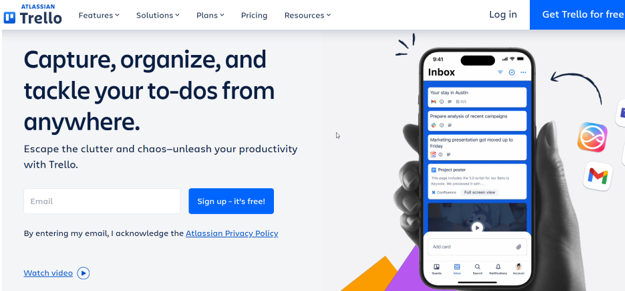
To effectively manage operations and client relationships:
Start with a simple client onboarding process. When someone hires you for the first time, explain what services you offer, how pricing works, and what they can expect. A smooth first experience builds trust and makes clients more likely to stick with you.
From there, focus on sending quotes and converting them into jobs. Quick, clear communication makes you look professional. Once the job is confirmed, send appointment reminders so clients don’t forget, and follow up after service to request feedback. These small touches show you care about quality.
Don’t overlook the importance of invoicing and payments. Many clients prefer digital options like online invoices, credit card payments, or apps like PayPal and Stripe. Making it easy to pay speeds up cash flow and reduces hassle.
As your business grows, consider automation and workflows. For example, set up automatic email reminders, recurring cleaning schedules, or standard checklists for each job. Consistency in operations ensures every client receives the same high-quality service, even when you’re busy.
Hire & Train Staff to Scale
At some point, you may reach the limit of what you can handle on your own. That’s when it’s time to hire help. Signs you’re ready include turning down jobs because of a full schedule or struggling to balance work with personal time.
Begin by writing clear job descriptions and posting them on platforms such as Indeed, local job boards, or even community groups. Be specific about the role, hours, pay, and expectations.
When applications come in, focus on screening candidates carefully. A quick interview or even a trial cleaning job can help you see if they’re reliable and match your quality standards.
Once hired, have a simple onboarding and training system. Provide checklists for daily tasks, create an employee handbook, and set clear rules for quality. Training doesn’t just cover cleaning skills; it should also teach professionalism, safety, and client communication.
To keep staff motivated, focus on retention and performance reviews. Regular feedback, fair pay, and recognition go a long way toward reducing turnover.
Finally, consider whether you’ll hire full-time employees or work with independent contractors. Employees give you more control and consistency, but contractors may reduce overhead costs. Each option has advantages and disadvantages depending on your goals and local labor laws.
By hiring and training correctly, you’ll free up your time, take on bigger jobs, and scale your cleaning business without losing quality.
![Start a business website with Hosted.com's Web Hosting and easy domain setup. [Learn More] Start a business website with Hosted.com's Web Hosting and easy domain setup. [Learn More]](https://www.hosted.com/blog/wp-content/uploads/2025/10/start-a-cleaning-business-02-1024x229.webp)
How to Register a Domain Name for Your Website
VIDEO: Register a Domain Name for Your Website
FAQS
Can I start a cleaning business on my own, or should I hire staff immediately?
Many owners begin solo to save costs and gain experience. Once you have regular clients and can’t keep up with demand, hiring staff helps you scale without turning away any jobs.
How can I attract my first clients when I start a house cleaning business?
Start by reaching out to your personal network, offering referral discounts, and listing your services online through a simple website or Google Business Profile. Flyers, door hangers, and social media groups in your area can also attract your first customers.
What’s the best way to price cleaning jobs fairly?
The best approach is to calculate your costs, including labor, supplies, and overheads, and then add a profit margin. Many businesses use hourly rates for small jobs and flat rates or contracts for larger or commercial work.
Do I need special training or certification to start a cleaning business?
In most areas, you don’t need formal training to clean homes or offices. However, certifications in carpet cleaning, eco-friendly cleaning, or mold removal can provide credibility and permit you to charge higher rates.
How much money do I need to start a cleaning business?
You can start with as little as a few hundred dollars if you focus on basic residential cleaning. Costs include supplies, insurance, and a business license. Adding equipment or staff will increase your budget, but the entry cost is still lower than that of many other businesses.
Other Blogs of Interest
– What is Web Hosting – Everything You Need to Know
– Finding Web Hosting For Students
– Web Hosting vs Cloud Hosting: How are They Different
– How Does Web Hosting Work? Understanding The Basics
– Web Hosting Vs Website Builder: Key Differences
- About the Author
- Latest Posts
Chantél Venter is a creative writer, strategic thinker, and a serious gesticulator. She’s passionate about storytelling, small businesses and bringing color to the world – be it through her words or wardrobe.
She holds a four-year degree in Business and Mass Media Communication and Journalism. She’s been a copywriter and editor for the technology, insurance and architecture industries since 2007 and believes anybody can run a small business successfully. She therefore enjoys finding and sharing the best and most practical tips for this purpose.

















